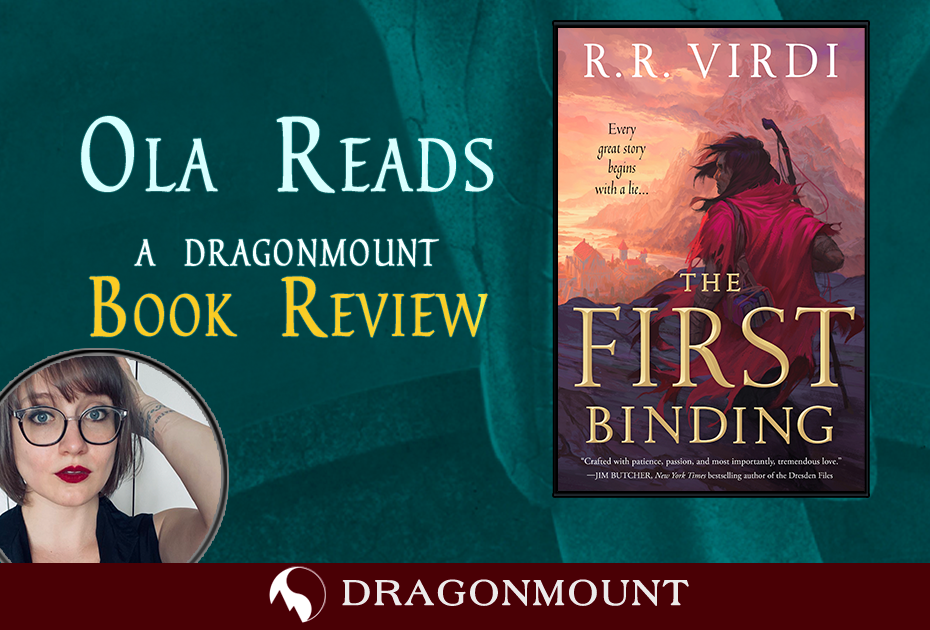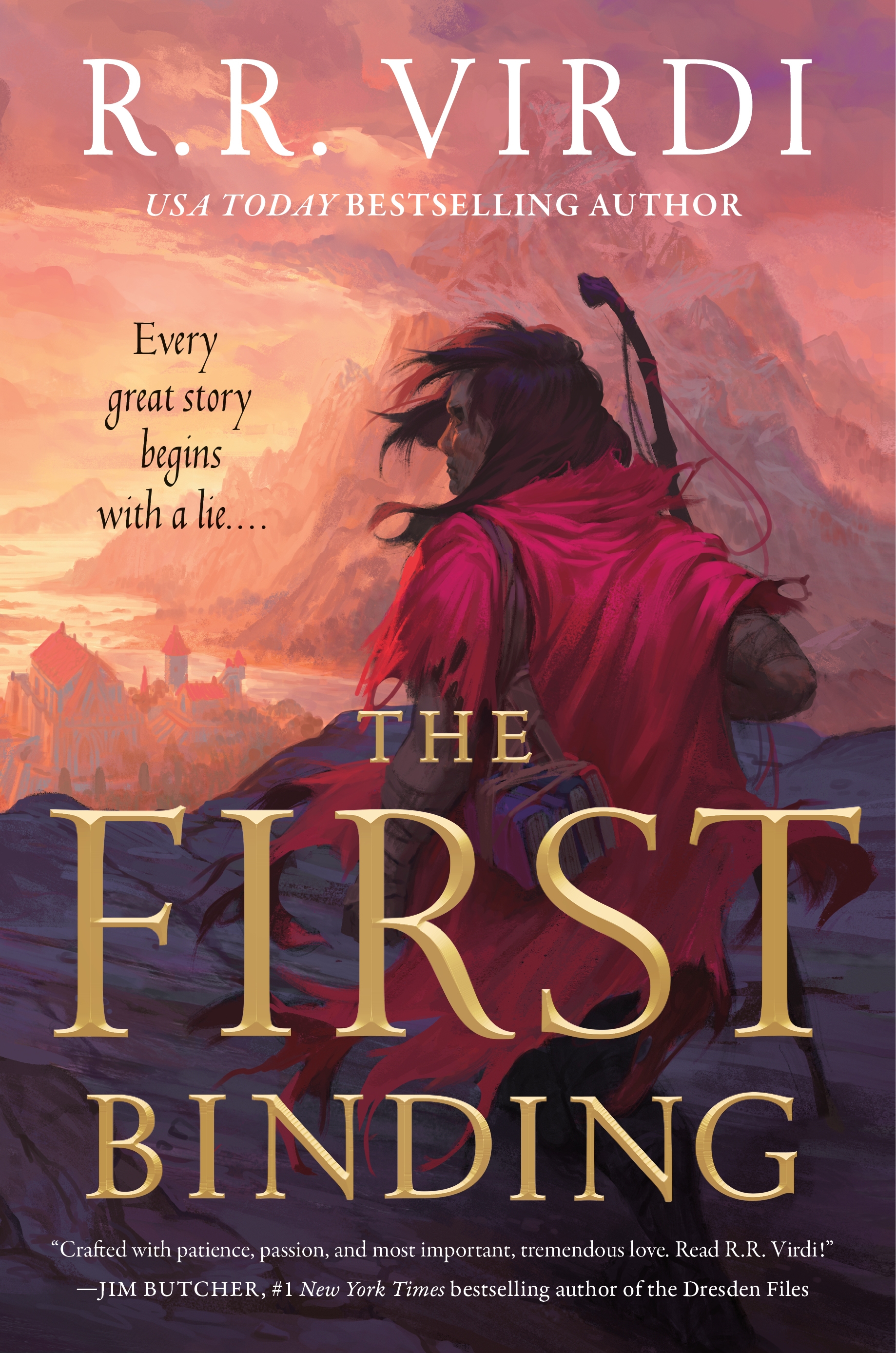
Aleksandra (Ola) Hill is a Polish-Canadian writer and the founder and editor-in-chief of khōréō, a magazine of speculative fiction by immigrant and diaspora writers. She won the grand prize in the 2019 Writer’s Digest Popular Fiction Awards and is currently pursuing an MFA in writing at The New School. You can find her on Twitter at @_aleksandrahill.
#
TL;DR: The First Binding by R. R. Virdi is a South-Asian-inspired epic fantasy that builds heavily on the traditions of Tolkien, Rothfuss, and Jordan to create something startlingly original. Recommended for fans of The Kingkiller Chronicles and She Who Became the Sun. The first book in the Tales of Tremaine series, it’s a promising start to a complex, intriguing world.
#
 The First Binding is a hefty book, clocking in at over 800 pages. Those who are familiar with the genre will immediately recognize the structure of The Kingkiller Chronicles: a figure shrouded in magic and conflicting legends, myths, and tales tells—we think—his true story.
The First Binding is a hefty book, clocking in at over 800 pages. Those who are familiar with the genre will immediately recognize the structure of The Kingkiller Chronicles: a figure shrouded in magic and conflicting legends, myths, and tales tells—we think—his true story.
And that story is something. Ari, our protagonist, is now known as simply the Storyteller: a magician who wanders the world telling stories with hefty doses of magic both in them, and used in the performances thereof. Yet he once was an orphan working in the understage of a theater in the bustling city of Keshum. He knew nothing of his family or past, but does know stories: the legends of the creation of the world and the great heroes of lore, which are inspired from Hindu mythology/cosmology. It is clear how much the author loves both his source material and storytelling in general, and how deeply meaningful both are to him. Early on in the novel, Ari says: "I don't know if you're aware of what it's like to be deprived of your past, your parents. The idea that there is nothing connecting you to anyone in this world apart from your work. There is a certain hollowness, singular and all encompassing [sic], that fills you. The notion that you are all that is—nothing more—and when you're not much on your own, it's a rather crushing thing." (p.89). The manner in which Virdi weaves stories-within-stories-within-stories in this book is an absolute pleasure both in how they snuck up on me as a reader and how well they fit both the narrative and the philosophy: that a story, fuzzy as it is, is both identity and truth.
Eventually, Ari encounters magic for the first time. When a Binder arrives at the theater, he learns not just that magic exists, but that he may learn it, too. In this world, magic is enacted through five pairs of Bindings, where each member of a pair acts as counterbalancing force to the other. These bindings are controlled by the "folds" of the mind—a compounding of your thoughts to create your own version of the world, reminiscent of the Mythbusters' quip of "I reject your reality and substitute my own." More folds result in stronger magic, or a stronger counterbalancing: if I use six folds to lob a stone at your head and you use eight to imagine yourself dodging it, then you will be safe; less, and you will probably end up with a lump on your forehead. Before Ari can learn any of the Bindings, he must learn the folds; before he can learn the folds, he must learn to settle his mind. The exercises he is first set to—the candle and flame—are strongly reminiscent of the flame and void that Tam teaches Rand in The Wheel of Time. Ari is promised the opportunity to study at a magic school named the Ashram if he works hard with his new teacher.
And he wants to learn:
Quote
"I knew what I really wanted in life. To birth my own flame. To understand fire and shape it the way it once had been eons ago. I didn't want to play in a story. I wanted to be the story. A legend in my own right.
A child's ambition knows no bounds. And a man or woman who holds to that can go on to do great or horrible things." (p. 121)
Yet, before Ari can do so, tragedy strikes and he must put of his dreams of the Ashram a little bit longer. Perhaps the most marvelous part of this story is not the magic system (which I greatly enjoy), but the combination of Ari’s absolute determination to survive and succeed and his utter inability to hold his tongue—to the point of seeming to have a death wish at times. He's reminiscent of Matrim Cauthon in that sense: someone you can't help rooting for despite the fact that you're certain you'd want to thwap him over the head if you had to spend any time with him in person.
His personality is also perfect for the magic that exists in the world: he is hungry and ambitious in a way that I felt in my bones; he wants more viscerally than almost any character I’ve ever encountered. And that means that he lives on the edge of a knife. “There is a cost to magic—old magic especially,” a teacher tells him. “If you wish to enforce your will on the world, shape it—shift it—make it—break it, what do you think will be the cost, hm? If you wish to affect it, do you think you will be spared its effects on you? There. Are. Costs.” (p. 573). As Ari comes closer and closer to wielding magic as a child, the reader feels the tension rising, knowing that he can’t possibly fathom the costs and that there is a very real chance that he might not think about them until it’s too late.
Though I found myself breathlessly reading many parts of this book, I do have to note that it was a very slow start for me. While it seems many readers found the prose compelling from the first page, I found it somewhat overdramatic; it eventually settles into competent, very readable writing. In larger part, however, I found Virdi's writing of female characters deeply irritating in a way that was reminiscent of the most outdated parts of The Wheel of Time —a gender essentialism that feels forced and unnecessary and like it belongs in the 1980s/90s. In the “present tense” sections of the book, Ari spends almost the entire time telling the story of his childhood to Eloine, the singer/temptress/’broken thing’ our narrator meets in the first chapters of the book. I flipped to a random page to draw an example: this isn’t the most egregious one I could remember, but it is representative:
Quote"She had a point. Most women always do. But it can be a terrible danger to let them know you know that." (p. 45)
By this point, I had already annotated "omg, stopppp" in the margin: so many of these interactions feel so cliché that is seems the author is either trying to parody classic fantasy works or prove his own maturity in matters of romance. Eloine is at times coy, at times humourous, at times wounded—but only quietly so, hinting at trauma without ever speaking of it. In general, the various women in Ari's life all feel insufficient, foils for his experience and learning rather than true characters on their own (though, to be fair, many of the male characters are treated in the same way: Ari is, above all, a self-centered figure out of the need to survive).
Most importantly, all the past sections of this book (let's say about 500 pages of the total text) are told directly by Ari to Eloine, within the first few days of meeting, while hearing barely anything of her story—which translates to about thirteen hours of speech on Ari's part. The idea of listening to a monologue that long from a person I just met, regardless of gender, is truly horrifying and often pushed my suspension of disbelief to the point of breaking. If I hadn't promised to review this book, I would have likely given up within the first fifty pages, as many folks on GoodReads seem to have done.
But, I pushed on—and I’m glad I did. At page 97, I finally found myself pulled deeply into the world. My interest waxed and waned throughout; I inhaled the past tense and found myself often trudging through the present. Ultimately, however, I found myself so compelled by the magic system and the setting that I fell in love with the world.
And, I suppose, Virdi would quote his book right back at me for my gripes:"[i]t's a horrible thing when someone asks for a story and isn't willing to patiently sit through it and listen" (p. 129). This one required a lot of patience for me; for others, I’m certain it will be a breeze.
Above all, I believe that what he is trying to do is something excellent: pull something new into fantasy. It builds on familiar foundations while drawing from a well of tradition that has been underrepresented in fantasy. I am deeply curious about the life that Ari leads and how he ends up growing, changing, learning, suffering, loving, losing. If the “present tense” of the story were written as engrossingly as the “past tense” section, I would unquestionably continue on this series and await the next book eagerly. As it stands, I am mildly hesitant but overall hopeful and look forward to seeing where Virdi goes with Book 2.
I recommend The First Binding for any reader hungry for an epic fantasy that builds on the tradition of the ‘classic’ greats like Jordan, Rothfuss, and Martin while integrating South Asian lore. I most heartily encourage curious readers to give it a try. I hope to see this trilogy become successful—I want more stories like this one in the world, and I think Virdi is a strong early voice to build on this branch of the genre.
The First Binding is available in the Dragonmount eBook store. Find it here!
Reviewer Note: Quotations are pulled from the ARC of The First Binding; they may have been updated in the final version of the book.











Recommended Comments
There are no comments to display.
Join the conversation
You can post now and register later. If you have an account, sign in now to post with your account.
Note: Your post will require moderator approval before it will be visible.